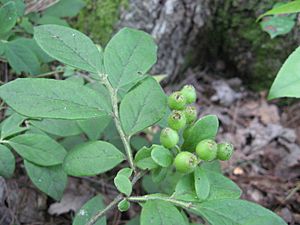Hairy blueberry facts for kids
Quick facts for kids Hairy blueberry |
|
|---|---|
 |
|
| Conservation status | |
| Scientific classification | |
| Kingdom: | |
| (unranked): | |
| (unranked): | |
| (unranked): | |
| Order: | |
| Family: | |
| Genus: | |
| Species: |
V. hirsutum
|
| Binomial name | |
| Vaccinium hirsutum Buckley 1843
|
|
| Synonyms | |
|
Cyanococcus hirsutus (Buckley) Small |
|
The hairy blueberry (Vaccinium hirsutum) is a special kind of flowering plant. It belongs to the heath family, which includes many well-known plants like cranberries and rhododendrons. This plant gets its name from the tiny hairs found on its leaves and berries.
Contents
Discovering the Hairy Blueberry Plant
Where the Hairy Blueberry Lives
The hairy blueberry is a unique plant found only in a small part of the southern Appalachian Mountains. It grows in just a few counties across eastern Tennessee, northern Georgia, and the Carolinas. This means it is an "endemic" species, which means it naturally lives in only one specific area.
This plant prefers to grow on dry ridges where oak and pine trees are common. In these areas, the hairy blueberry can sometimes be found in large numbers, forming big groups of plants.
What the Hairy Blueberry Looks Like
The hairy blueberry grows as a shrub, which is a woody plant smaller than a tree. It can reach a height of about 75 centimeters (or about 28 inches). These shrubs often grow together, creating large colonies or patches of plants.
Its leaves are quite thick and shaped like an oval. They can grow up to 62 millimeters (about 2 and a half inches) long. What makes them special is that they are covered in many tiny hairs, giving the plant its "hairy" name.
Flowers and Berries
In the late spring, the hairy blueberry plant produces its flowers. These flowers are white and shaped like small cylinders. They are quite pretty and attract pollinators.
After the flowers bloom, the plant starts to grow its berries during the summer. These berries are black when they are ripe. Just like the leaves, the berries also have tiny hairs on them, which is unusual for a blueberry.
 | Precious Adams |
 | Lauren Anderson |
 | Janet Collins |


